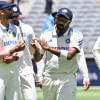Australia failed children, national sex abuse: Report

Australian institutions "seriously failed" children in their care with tens of thousands sexually assaulted, the final report from a five-year inquiry said Friday as it recommended that celibacy among Catholic priests should be voluntary to help curb abuse.
The government ordered the Royal Commission into Institutional Responses to Child Sexual Abuse in 2012 after a decade of pressure to investigate widespread allegations across the country.
The commission was contacted by more than 15,000 survivors who detailed claims of child abuse involving churches, orphanages, sporting clubs, youth groups and schools, often dating back decades.
It heard horrific stories during often confronting and emotionally exhausting public and private hearings.
In total, more than 4,000 institutions were accused of abuse, with many of them Catholic-managed facilities.
"Tens of thousands of children have been sexually abused in many Australian institutions. We will never know the true number," the final report said.
"Whatever the number, it is a national tragedy, perpetrated over generations within many of our most trusted institutions."
It said abuse occurred in almost every place where children resided or attended for educational, recreational, sporting, religious or cultural activities.
And it was not a case of a few "rotten apples".
"Some institutions have had multiple abusers who sexually abused multiple children," it said.
"Society’s major institutions have seriously failed. In many cases those failings have been exacerbated by a manifestly inadequate response to the abused person.
"The problems have been so widespread, and the nature of the abuse so heinous, that it is difficult to comprehend."
More than 2,500 referrals have been made to police, with 230 prosecutions under way.
Never investigated
The 17-volume report included recommendations for a shake-up of centuries of religious tradition, calling for Catholic ministers to be required to report abuse confided to them during confession.
It also urged the Catholic Church to make celibacy voluntary for its clergy, saying the existing requirement contributed to child abuse.
Melbourne Archbishop Denis Hart apologised for the church's "shameful" past, but said it was up to the Vatican to decide on any changes.

He insisted the seal of the confessional "can't be broken", but said if someone confessed he was an abuser he would refuse them absolution until they went to the authorities.
Asked about voluntary celibacy, he said it was a "difficult thing".
"But I certainly would see the bishops pass on that recommendation to the Holy See, and they would then decide," said Hart, president of the Australian Catholic Bishops Conference.
Among other recommendations was the creation of a National Office for Child Safety and a helpline to report abuse.
During its hearings, the commission heard that seven percent of Catholic priests were accused of abuse in Australia between 1950 and 2010, but the allegations were never investigated, with children ignored and even punished when they came forward.
There were more than 1,800 alleged perpetrators, with the average age of the victims at the time 10 for girls and 11 for boys. The St John of God Brothers religious order was the worst in terms of allegations, with over 40 percent of members accused.
The inquiry embroiled Australia's most senior Catholic cleric George Pell, now the Vatican's finance chief, who was questioned over his dealings with paedophile priests in Victoria state in the 1970s.
Pell is currently accused of multiple historical sexual offences, with a committal hearing in March due to decide if there is enough evidence from the prosecution for the case against him to go to trial.
Prime Minister Malcolm Turnbull paid tribute to the courage of survivors who gave evidence.
"The Royal Commission has validated the stories of survivors, has enabled survivors to be heard, and importantly, to be believed. For too long, crimes against our nation's children were covered up, or ignored," he said.

 For all latest news, follow The Daily Star's Google News channel.
For all latest news, follow The Daily Star's Google News channel. 








Comments